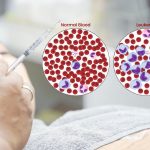Cryopyrin-Associated Periodic Syndromes (CAPS) comprise three related conditions: Familial Cold Autoinflammatory Syndrome Type 1 (FCAS1), Muckle-Wells Syndrome, and Neonatal-Onset Multisystem Inflammatory Disorder (NOMID). These disorders were previously considered distinct but are now recognized as a spectrum with varying severity levels. CAPS involves recurring skin rash, fever, and joint pain triggered by cold exposure, stress, or spontaneously.
Symptoms:
- FCAS1:Cold-triggered rash, pain, chills, fever, muscle aches, drowsiness, eye redness, headache, and nausea.
- MWS: Rash, fever, joint pain, hearing loss, skin lesions, and kidney damage (amyloidosis).
- NOMID: Skin rash, fever, joint inflammation, cognitive impairments, chronic meningitis, eye problems, and organ damage.
Causes:
Due to mutations in the NLRP3 gene, CAPS is caused, which encodes the cryopyrin protein. Cryopyrin plays a role in the immune system’s inflammatory response by assembling an inflammasome, a molecular complex. Mutations in NLRP3 lead to an overactive cryopyrin, triggering excessive and inappropriate inflammation, which results in the characteristic CAPS symptoms.
Diagnosis:
Diagnosing CAPS involves:
Clinical Evaluation: Assessing recurring symptoms of rash, fever, and joint pain, along with their triggers.
Genetic Testing: Identifying mutations in the NLRP3 gene through genetic analysis.
Inflammatory Markers: Inflammation is confirmed by elevated inflammatory markers such as serum amyloid A (SAA) and C-reactive protein (CRP).
Treatment:
- Managing CAPS focuses on reducing symptoms and inflammation. Treatment options include:
- IL-1 Antagonists: Drugs like Kineret (anakinra) block IL-1 signaling, effectively managing symptoms.
- Other Biologics: Medications like canakinumab and rilonacept also target inflammation and show promise.
- Symptom Relief: Pain relievers, antihistamines, and supportive care alleviate discomfort.
- Early Intervention: Timely treatment minimizes complications like amyloidosis and improves quality of life.
References
https://medlineplus.gov/genetics/condition/cryopyrin-associated-periodic-syndromes/#synonyms
https://www.ncbi.nlm.nih.gov/pmc/articles/PMC7794776/






